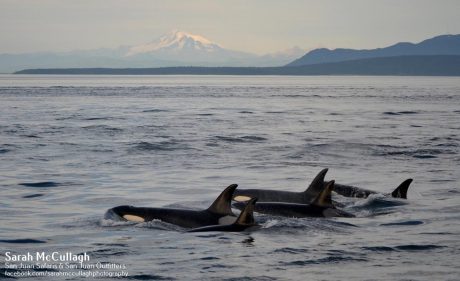Petrochemical Export Project Canceled
Posted December 31, 2019 at 5:46 am by Tim Dustrude
Deal prevents climate pollution, protects Southern Resident orcas
Deal signed by Environmental Organizations, Skagit County, and Refinery will allow clean air projects to proceed and halts new petrochemical processing and export at Anacortes Oil Refinery
SKAGIT COUNTY, WA — In an agreement announced today, the owners of the Anacortes Oil Refinery agreed to withdraw plans to manufacture and export 15,000 barrels per day of mixed xylenes — petrochemicals used to make plastics — through the Salish Sea. In exchange, six environmental organizations agreed to drop an ongoing appeal of related permits. Skagit County, which issued the permits, has also signed the agreement.
The proposal to produce and export mixed xylenes would have caused a dramatic increase in energy use required for the refinery, resulting in a climate impact equivalent to adding 75,000 vehicles to the road. The project would have required the refinery to transport significant quantities of feedstocks, as well as shipping tankers of the refined product to Asia. The appellants argued that the County’s environmental impact statement did not adequately analyze the risk of the additional vessel trips, exacerbated risk of an oil and chemical spill, and increased threats to the critically endangered Southern Resident Killer Whale population. The agreement announced today eliminates these impacts.
The six organizations have agreed not to oppose Tesoro Refining and Marketing Co LLC – a subsidiary of Marathon Petroleum Corporation – in constructing their marine vapor emission control system (MVEC). The MVEC system will capture and burn fugitive vapors that could otherwise be released and cause pollution during loading and unloading of petrochemicals at Marathon’s pier. The system was necessary to manage the increased emissions that would have occurred from the xylene export proposal, but can also be used to limit the impact of existing operations. Other project components related to reducing the sulfur content of diesel were not opposed and have already been completed.
The environmental organizations that appealed the decision are Friends of the San Juans, Stand.earth, RE Sources for Sustainable Communities, Friends of the Earth, Puget Soundkeeper, and Evergreen Islands. The groups are represented by Crag Law Center.
Members of the appeal group issued the following statements:
“This is a win for the Southern Resident Killer Whales. This project would have brought 120 new vessel transits each year through the Southern Residents critical habitat, increasing vessel impacts and the risk of a disastrous petrochemical spill,” stated Stephanie Buffum, Executive Director of Friends of the San Juans.
“Washington State is going to use less and less fossil fuel every year from now on. Instead of planning for the future, some fossil fuel companies are trying to shift to foreign markets and export their polluting products. We need to be clear that our intent is a clean energy economy, not different pollution somewhere else. This agreement sets that precedent” stated Matt Krogh, Extreme Oil Campaign Director, Stand.earth
“Today’s win is a win for our waters, and demonstrates the importance of standing up against dirty fossil fuels. We must remain vigilant and hold the line against proposed petrochemical projects in our region,” said Alyssa Barton, Policy Manager with Puget Soundkeeper.
“Allowing the marine vapor control system while preventing xylene export and manufacture is a win win. The MVEC will improve air quality and working conditions on the dock, while avoiding the impacts on the climate from new and unnecessary petrochemical processing,” said Tom Glade, President of Evergreen Islands.
“Anacortes’ plan to manufacture and export 15,000 barrels of mixed xylenes a day would have been the equivalent of adding 75,000 cars to the road,” said Verner Wilson III, senior oceans campaigner at Friends of the Earth U.S. “This agreement shows how important voices fighting against polluters are. By holding oil and gas companies accountable we can prevent further climate pollution.”
“This agreement is a win for the Salish Sea, local air quality and public health,” said Eddy Ury, Clean Energy Program Manager at RE Sources for Sustainable Communities. “Tesoro packaged their petrochemical export expansion for environmental review together with unrelated upgrades for low-sulfur fuels and controlling dockside emissions, attempting to hide the impacts and make it more difficult to challenge. We called them out, and have arrived at a compromise that allows Tesoro to complete their clean products upgrades and emissions control system without the mixed xylenes project.”
BACKGROUND AND TIMELINE
Summer 2015: Tesoro proposed the project and began filing permit applications.
March 2016: Skagit County required a full EIS (environmental impact statement).
March- April 2017: Skagit County released a Draft EIS, and more than 7,500 comments were submitted, including comments from six environmental organizations that would later file a legal challenge to the project. The overwhelming majority of comments urged the County to address concerns over worker safety standards, petrochemical spills in the Salish Sea, risks to endangered orcas, increasing crude oil train traffic, and use of the new facility for crude oil export. Commenters also asked the County to separately review the xylenes export and clean products upgrade components of the project, while properly accounting for greenhouse gas pollution.
July 2017: Just two months after the end of the comment period, the County released a Final EIS which was substantially unchanged from the draft EIS, failing to address commenters concerns.
November 2017: Skagit County Hearing Examiner held a public comment period and public hearing on the Shoreline Substantial Development Permit for the Marine Vapor Emissions Control Unit. More than 100 people attend, with 60 of the 65 presenters speaking against the permit.
December 2017: The Skagit County Hearing Examiner issued the permit. The six environmental organizations, represented by Crag Law Center, appealed the decision to the Skagit County Board of Commissioners. Concerns raised by the appellant group focused on the need for a Conditional Use Permit and the inadequacy of the EIS’s analysis of spill risk, marine impacts, including the endangered Southern Resident orcas and greenhouse gas analysis.
February 27, 2018: A hearing was held in front of the Board of Commissioners with arguments made by both sides. More than 100 members of the public attended the hearing, most wearing red to signify opposition to the project.
March 2018: Skagit Board of Commissioners affirmed the Hearing Examiner’s decision.
April 2018: Appellants requested a review of the decision by the Washington State Shorelines Hearings Board (SHB). Appellants requested that the SHB vacate the permit and require additional environmental review. The appellants alleged that the review, performed by Skagit County staff, failed to adequately consider the impacts from increased vessel traffic in the Salish Sea, increased risk of petrochemical and oil spills, increased emissions of greenhouse gases, increased impacts to air and water quality and increased threats to public health and safety. It also overlooked increased impacts to fish and wildlife resources — including the endangered Southern Resident orcas.
September 2018: SHB issued summary judgment in the case, upholding the permit and announcing a new rule: that in appealing an EIS that relates to a project with multiple permits, those with concerns must appeal the first permit issued regardless of whether that permit relates to the identified concerns. This new rule had no basis in existing law or policy and as a precedent for other cases, could have had serious negative repercussions, were it allowed to stand.
November 2018: Appellants requested a review of the decision by Thurston County Superior Court.
October 2019: Thurston County Superior Court overturned the decision from the SHB and determined that the appellants’ original appeal was appropriate, that appellants did not have to appeal the first permit issued to challenge the EIS, and remanded the case back to the SHB for a decision on the merits.
December 2019: Marathon and appellants reach an agreement and settle the case. Marathon agrees to drop the mixed xylenes proposal, permanently.
Read more in a Crosscut op-ed: Canada is protecting orcas from oil spills. Why aren’t we? (October 2, 2018)
You can support the San Juan Update by doing business with our loyal advertisers, and by making a one-time contribution or a recurring donation.
Categories: Environment











No comments yet. Be the first!
By submitting a comment you grant the San Juan Update a perpetual license to reproduce your words and name/web site in attribution. Inappropriate, irrelevant and contentious comments may not be published at an admin's discretion. Your email is used for verification purposes only, it will never be shared.